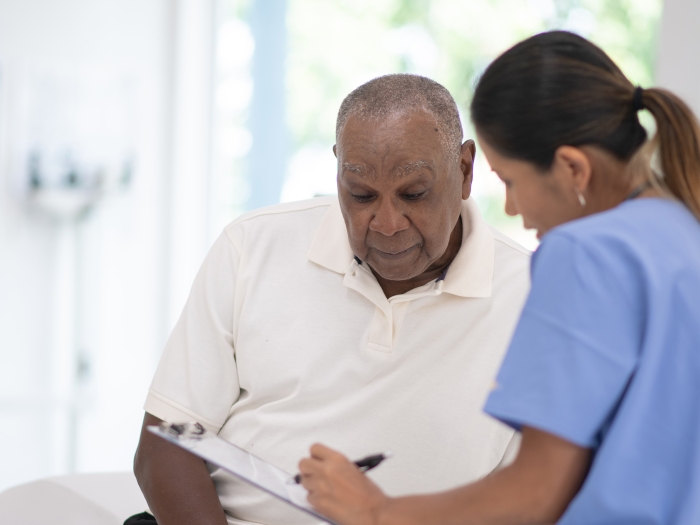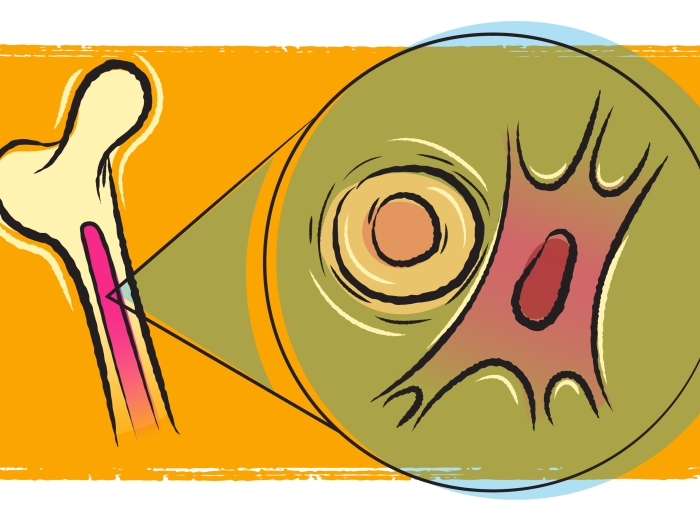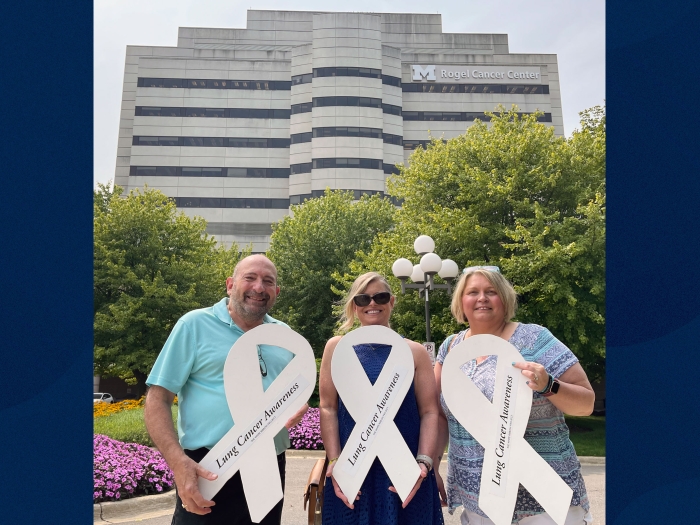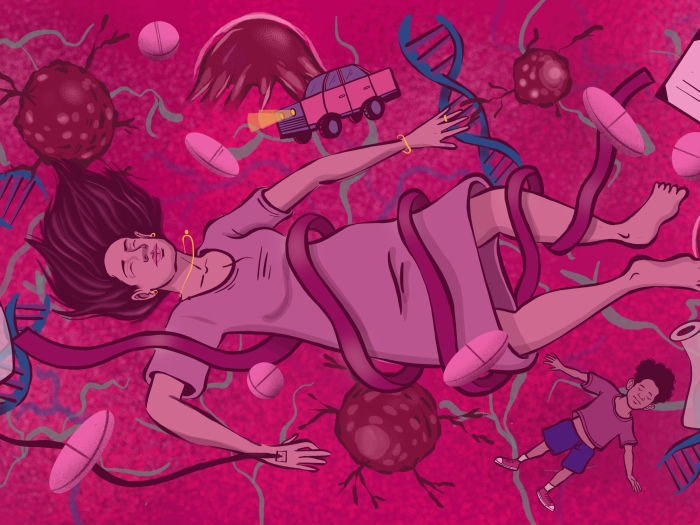A strong care team helped a young woman thrive after losing a limb to cancer. Now, she’s standing up for amputees in need.
7:00 AM
Author |

For Nicole Ver Kuilen, cancer was largely in the past. The 26-year-old lost her leg at age 10 to a rare bone cancer called osteosarcoma. A runner and athlete nonetheless, the Minnesota native had grown used to living with a prosthetic leg.
MORE FROM MICHIGAN: Sign up for our weekly newsletter
But she was surprised to learn of her risk for other health problems — including heart disease — as a result of her cancer treatment years ago.
As a college student at the University of Michigan, Ver Kuilen received care for her prosthetic leg at U-M's Prosthetics and Orthotics Center in 2012. Working with Alicia J. Davis, CPO, FAAOP(D) senior prosthetist and orthotist, she was referred to the Sarcoma Survivorship Program at U-M's Rogel Cancer Center to begin the important step of monitoring her health into adulthood.
"I was very grateful, as I had no idea that I was at increased risk for heart disease due to my cancer treatment," Ver Kuilen says. "I am now on Lipitor to reduce my high cholesterol as a preventative measure."
Understanding long-term effects of cancer
The Sarcoma Survivorship Program provides comprehensive follow-up care to sarcoma survivors age 18 and older who have been off therapy for at least two years and to patients who are transitioning from pediatric to adult medical care.
Heart disease is just one possible later-in-life effect for childhood chemotherapy patients such as Ver Kuilen.
SEE ALSO: Beating Cancer Shaped Mott Employee's Career Path
Sarcoma survivors are also at higher risk for type 2 diabetes, high blood pressure, lipid disorders, kidney failure, mental health problems and new cancers. These conditions often surface in patients as early as their 30s or 40s, far younger than the average onset overall.
"Survivorship care is more than monitoring for cancer recurrence or new cancers, it is about empowering the survivor with the knowledge of potential social and physical long-term effects of the cancer therapy throughout their life," says Erin Peregrine Antalis, Ph.D., MPH, manager of the Sarcoma Survivorship Program.
The approach is key to good health as these patients grow older.
"Sarcoma survivors face issues specific to their surgeries, radiation treatment, systemic chemotherapy and psychosocial issues that can have a major impact on long-term health," says Laurence Baker, D.O., director of the Rogel Cancer Center's Multidisciplinary Sarcoma Clinic. "The good news is that those chronic illnesses can often be prevented or minimized."
An all-encompassing health care team
Ver Kuilen knows firsthand it takes a team to beat cancer and, for many childhood sarcoma patients, the team continues to grow and evolve into adulthood.
"I don't think I would have received this kind of care anywhere else," she says. "This multidisciplinary approach is where U-M shines. Knowing these extra risk factors to my health because of my cancer treatment has also emboldened me even more to fight for my right to have access to the prosthetic technology and the care I need."
Follow-up care at the survivorship clinic includes a health and cardiac exam along with lifelong planning and monitoring — including planning for cancer prevention and surveillance based on the survivor's personal risk, cancer therapy, genetic predispositions, lifestyle behaviors and other health conditions.
Eager to help the cause and aid others, Ver Kuilen also joined a research project involving U-M and partners at the University of Utah and University of California, Davis, studying the underlying cause of childhood bone sarcoma and early signs of heart disease and other conditions before the age of 30.
Her ongoing care also continues at the Orthotics and Prosthetics Center and the Department of Physical Medicine and Rehabilitation.
A fight for amputee rights
With her long-term health stable and monitored, Ver Kuilen can now put her energy into her immediate goal: improving the lives of fellow amputees.
SEE ALSO: Four-Time Organ Transplant Recipient Pays (and Pedals) It Forward
An avid cyclist, swimmer and runner, she started a nonprofit organization, Forrest Stump, which kicked off last fall with an eight-week, 1,500-mile trek from Seattle to San Diego to raise awareness and money for people with prosthetic devices.
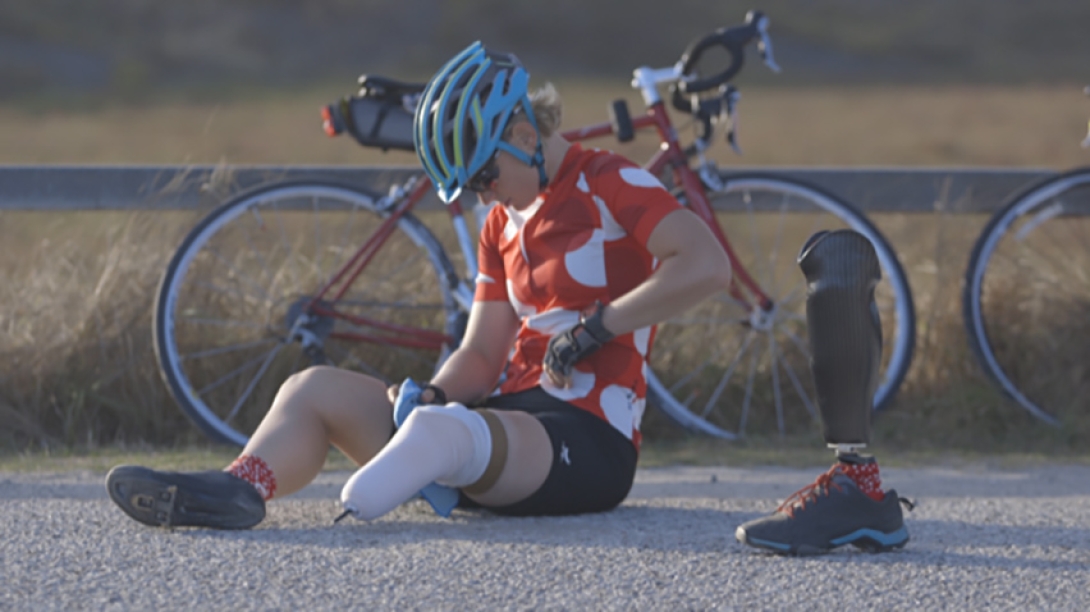
"Remaining mobile and active is critical to my longevity and survival. I already beat cancer and lost my leg because of it," Ver Kuilen says. "I don't want my inability to get access to a leg to be the reason I can't stay active and heart healthy in the future. And that is why Forrest Stump is so important to me personally, and to others. Mobility saves."
Ver Kuilen also advocates for amputee rights in future U.S. legislation, educating people about the inequalities amputees face in America's health care system. This spring, she visited congressional representatives in Washington, D.C., to advocate for the rights of amputees.
Even more exciting, she was named as the first-ever recipient of a fellowship at the National Association for the Advancement of Orthotics & Prosthetics. The 10-week program will teach her even more about orthotic and prosthetic policy and advocacy.
Her care team knows that patients like Ver Kuilen, ones who challenge the system and ask questions, are essential to furthering amputee rights.
"If Nicole Ver Kuilen's past performance is any indication, the NAAOP fellowship will pay dividends to the amputee, prosthetic and disability community for years to come," says Davis, the U-M prosthetist and orthotist.
"I have no doubt Nicole possesses the raw intellect, poise and energy to be one of the strongest and most visible advocates our field has ever seen."
Pushing the limits of legislation
Ver Kuilen recently took her first strides on a new prosthetic running blade, technology not typically covered by health insurance, but made available to her through donations by sponsors of her 1,500-mile journey.
She hopes all amputees will have access to the technology they need to live their best lives.
"Tiers of care exist in our health care system, where the best care and technology is only afforded to certain amputees," she explains. "For most amputees, insurance will only cover one prosthetic device per amputation. These devices are prohibitively expensive, ranging in price from $5,000 to $100,000. They are built to last three to five years and require ongoing repairs and adjustments."
These rules, restrictions and costs can limit highly active individuals.
Ver Kuilen notes that waterproof legs or activity-specific prosthetic technologies — designed for pursuits such as running, cycling and swimming — aren't covered by insurance because they are deemed not medically necessary.
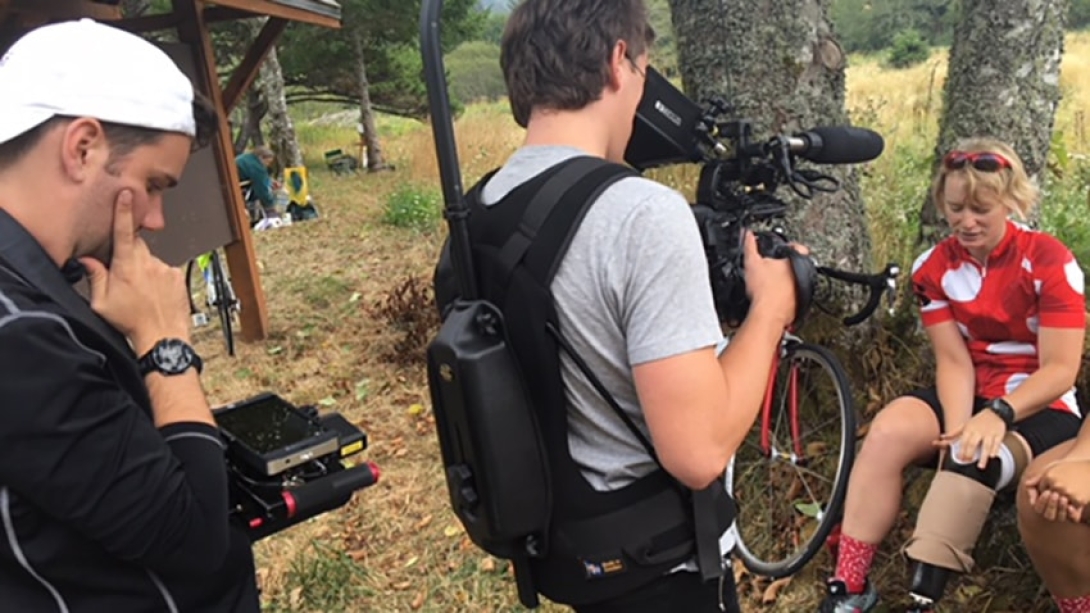
During her trip down the West Coast, she was the focus of documentary filmed by director Chris Duncan, who shares an interest in the cause. They are working to raise money for postproduction of 1,500 Miles with the intent of submitting it to film festivals this summer.
Ver Kuilen hopes the film will be a catalyst to bring awareness to the injustices amputees face and to create sustainable, lasting change in the field of prosthetics.
Moving forward, she's well aware of her own tough but remarkable journey.
"I gave up my leg — my mobility and independence — in order to gain freedom from cancer," she says. "I realized freedom in many forms is not without sacrifice, suffering and struggle. It is because of our sacrifices that we feel a fierce urgency to act."

Explore a variety of health care news & stories by visiting the Health Lab home page for more articles.

Department of Communication at Michigan Medicine
Want top health & research news weekly? Sign up for Health Lab’s newsletters today!
